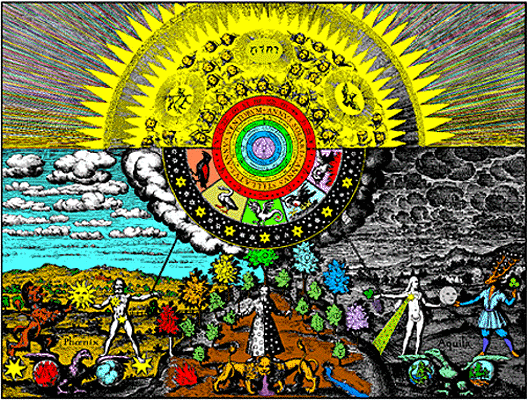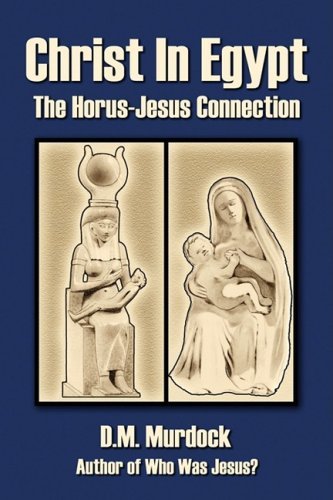 The more I have read of the works of Acharya S (aka D.M. Murdock) and the more engagement I have had with those who fervently advocate her views the more I have suspected that some form of cult-like belief system lies beneath their surface appearances. Part of the reason for my suspicions has been the vitriolic reactions on their part against any attempt to honestly critique their views and engage them in argument that consistently follows the norms of scholarly or “scientific” reasoning. I have been portrayed in some very colorful terms by both Acharya and those I believe it is fair to say are her followers. In effect I have been lumped together with others as deliberately closed-minded, bigoted and out to lyingly slander them. My record of defending Acharya against some of the worst insults I have read on the web counts for nothing.
The more I have read of the works of Acharya S (aka D.M. Murdock) and the more engagement I have had with those who fervently advocate her views the more I have suspected that some form of cult-like belief system lies beneath their surface appearances. Part of the reason for my suspicions has been the vitriolic reactions on their part against any attempt to honestly critique their views and engage them in argument that consistently follows the norms of scholarly or “scientific” reasoning. I have been portrayed in some very colorful terms by both Acharya and those I believe it is fair to say are her followers. In effect I have been lumped together with others as deliberately closed-minded, bigoted and out to lyingly slander them. My record of defending Acharya against some of the worst insults I have read on the web counts for nothing.
Finally one of Acharya’s fairly prominent online supporters, Robert Tulip, has “come out” and made it very clear that my suspicions were right all along. Astrotheology — the view they propagate — is a form of religious belief. They believe as strongly as any fundamentalist that they are right and anyone who does not agree with them after they explain it all is perverse or willfully blind. Expressions of disagreement are interpreted as expressions of hostility or even persecution.
And like religious cults, they curry good relations with prominent or respectable names that they believe will give their cause a benign public face. Anyone with public standing among those they seek to influence and who has had a positive word to say about Acharya’s books is promoted as a witness that they really are a genuinely scholarly (even scientific) group of truth-seekers. I have finally come to believe they are as scientific as Scientology; their efforts to claim to follow the scientific method are a falsehood. I doubt that people like Earl Doherty really do understand exactly what it is their names are being used to support when they insist that such people have made supportive comments about their publications.
My full awareness of all of this did not come quickly. I have hoped my suspicions were not true often enough. If I can be shown to be mistaken I would greatly welcome it and apologize for this post and withdraw it.
What finally led me to give up any remaining doubts I had about their religious or cult status was a series of posts on the EarlyWritings Forum. The most recent of these posts, under the title Loaves and Fishes, were prompted by pressure from a few of us for Robert to demonstrate the scientific or scholarly basis for his rejection of normal (“midrashic”/literary-critical) explanations for the miracle of the loaves and fishes in the Gospels and his belief that this narrative was written as a code of some sort for “astrotheology” beliefs. The result is the epitome of parallelomania (as I have explained this through Sandmel’s definitions a couple of times recently); but the worst part comes at the end when it is made very clear that Robert himself takes his interpretation as a personal belief system along with the fundamentalist-like view that anyone who fails to share his enlightenment is willfully perverse.
Here is Robert Tulip’s explication of the Gospels’ Miracle of the Loaves and Fishes. After reading this I finally realized I have been wasting my time taking many of his remarks testifying to an interest in the hypothetico-deductive method at face value. He — and I can only presume the same applies to Acharya S herself — are evidently not interested in scholarly approaches to Christian origins and really are about peddling a quasi-religious type of belief-system.
I have bolded the text that I consider to be the evidence that “astrotheology” as advocated here is indeed a genuine personal belief-system that shuts down any possibility of genuinely scholarly engagement and criticism.
At the end of the post I add a couple of scholarly reviews of David Ulansey’s argument that it was the ancient discovery of the precession of the equinoxes that prompted the rise of Mithraism and possibly even Christianity.
Continue reading “Astrotheology, A Religious Belief System (as per D.M. Murdock/Acharya S)”
Like this:
Like Loading...


